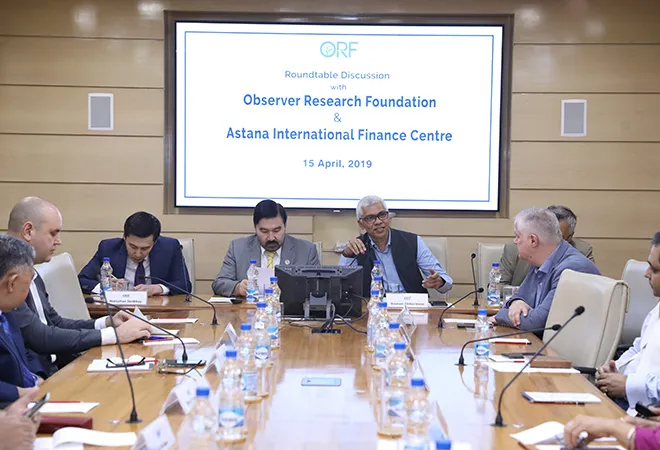There have been several changes in the political landscape in the geography of Central Asia — with the entry of China as a major player in funding infrastructure projects in the region, and the weakening influence of USA in the markets, along with the independence from Soviet Union.

On 15 April 2019, delegates from the Astana International Financial Centre (AIFC) and Observer Research Foundation, had a closed-door conference on the importance of strengthening bilateral relations between Kazakhstan and India. The talks were not only related to economic relations, but also encompassed how the two countries can combine efforts to ensure increased trade and connectivity in the changing geopolitical stances of the world.
There have been several changes in the political landscape in the geography of Central Asia — with the entry of China as a major player in funding infrastructure projects in the region, and the weakening influence of USA in the markets, along with the independence from Soviet Union — Kazakhstan has had to emerge as a critical power in the Central Asia region. With this, Kazakhstan is now looking to increase its presence in Central Asia by fostering ties with India to facilitate a North-South trade corridor. Thus, it is also important for India to look at Kazakhstan as a stepping stone into the markets of Central Asia and develop an outreach strategy to connect to Central Asia to compete with the growing presence of China in that region.
Kazakhstan already has very good trade relations with Europe and China and with BRI investments by China, the East-West trade is only going to flourish further. Therefore, there is a need to facilitate North-South trade so that India can make a visible presence in the Central Asian region. Even though Kazakhstan has grown to be a financial hub within the region, Central Asia as a region has not reached the same level of development. To ensure this, there is a yearning to fund as many infrastructure and connectivity projects within the region. Keeping this in mind, the delegates at the conference stressed on India’s role in building connectivity projects and increasing trade to more than 1 billion dollars; a feat that can be leveraged even more if the current growth rate continues to be constant. Chabahar Port is a seaport in Chabahar located in south-eastern Iran, on the Gulf of Oman and serves as Iran’s only oceanic port. India has committed to at least $21 billion to Chabahar–Hajigak corridor in a three-way MoU with Iran and Afghanistan. Both, Kazakhstan and India must use this to their advantage in increasing economic resilience within Central Asia. Middle term strategies need to be looked at in order to take advantage but with sanctions imposed on Iran this may create a problem. Both countries need to design plans to overcome this hurdle and continue to trade efficiently.
Another major issue is the growing influence of China in Central Asia and what that means for India’s outreach in the region. China’s involvement in key infrastructure projects for a larger strategic purpose like the China-Pakistan Economic Corridor (CPEC) and One Belt and Road Initiative (BRI) seems to be a credible threat to India’s objective on overcoming connectivity issues with Central Asia to ensure strengthened economic-political relations. There were major discussions around the same — from what goods to be traded to which routes to be used and how to ensure that these routes are not used for terrorist activities. These questions are important in answering how to make connectivity projects sustainable, especially because accessibility is limited within the tense geopolitical space of Central Asia. Despite having good relations with Afghanistan, political instability of Afghanistan and the bittered relations with Pakistan seems to be causing a deterrence for India in reaching Central Asia. Nevertheless, the delegates at the table were positive that INSTC and Chabahar could provide a big change in Central Asia with India becoming a key player in supporting huge trade and profits and being able to facilitate the practicalities and possibilities of increased trade and investment between Kazakhstan and India.
Instead of talking only about geographical connectivity though, it is also important to touch upon other aspects such as education, health and cybersecurity. India and Kazakhstan have built relations on fintech, space and military technicalities along with an Indian trade house in Astana. Even though India has a lot of soft power over Kazakhstan in terms of Bollywood presence, it has not realised how to use this latent power in influence or build relations with Kazakhstan. But Indian speakers were very adamant that Kazakhstan must make use of its educational and health facilities that further help improve relations.
The delegates at the conference agreed to focus on a long term strategy rather than a commercially viable one by taking some important steps together — find out a plan for India and Central Asia to encourage the Afghan government towards a secular government, prevent the use of roads used to connect the two regions from terrorists and other activities, and to ensure stability in the Central Asia region to promote North-South trade.
Despite all the issues, there are 460 Indian companies in Kazakhstan and 200 of them joined in the last two years alone. Kazakhstan is also the only country in the region to invest into India as it sees immense potential. In the same way, AIFC also believes that more big companies should come into Kazakhstan. And even though they have small and medium enterprises, they are keen on seeing more industries mushroom in India than can be beneficial for both states. The delegates from AIFC also mentioned that, even though its biggest market interests lie in eastern China and southern Russia, it recognises India’s potential as a big market and number one trading partner. On the other hand, Indian delegates also noticed the importance of connectivity infrastructure to continue progressive trade relations with Kazakhstan.
The session ended with delegates from both countries seeing the difficulties in achieving increased bilateral relations due to various reasons such as terrorism, political instability, lack of infrastructure, and geopolitical challenges. Keeping this in mind, the closed-door dialogue ended with necessitating a long term strategy that does not compel Central Asia to become a transit point in achieving Indo-Eurasian trade but instead, includes a blueprint to achieve a North-South economic corridor.
This report is prepared Ruchbah Rai.
The views expressed above belong to the author(s). ORF research and analyses now available on Telegram! Click here to access our curated content — blogs, longforms and interviews.




 PREV
PREV

